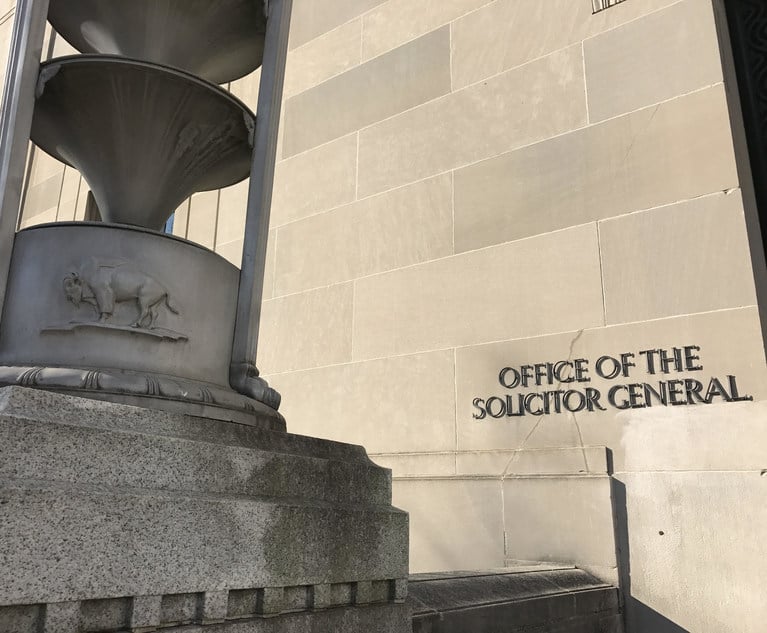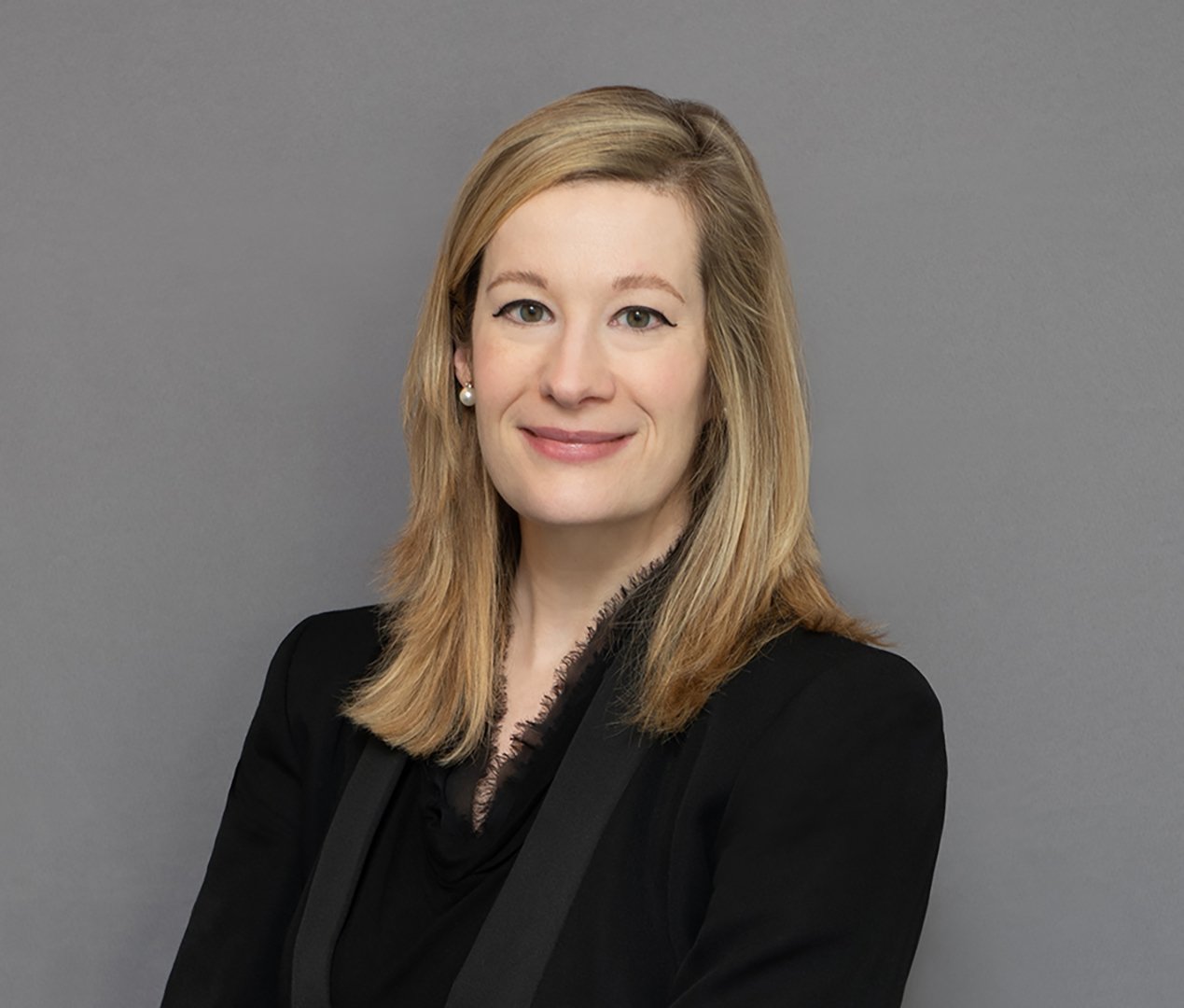 Virginia Thomas (right), U.S. Supreme Court Justice Clarence Thomas's wife, smiles during the "Law Symposium: Justice Thomas's Thirty-Year Legacy on the Court," Co-hosted by The C. Boyden Gray Center for the Study of the Administrative State and The Heritage Foundation, in Washington, D.C., on Thursday, October 21, 2021. (Photo: Diego M. Radzinschi/ALM)
Virginia Thomas (right), U.S. Supreme Court Justice Clarence Thomas's wife, smiles during the "Law Symposium: Justice Thomas's Thirty-Year Legacy on the Court," Co-hosted by The C. Boyden Gray Center for the Study of the Administrative State and The Heritage Foundation, in Washington, D.C., on Thursday, October 21, 2021. (Photo: Diego M. Radzinschi/ALM) The Marble Palace Blog: When Justices Have Lawyers in the Family
It's no surprise that Supreme Court justices have lawyers as relatives, but sometimes when they do, things get tricky.
June 17, 2022 at 12:13 PM
6 minute read
Thank you for reading The Marble Palace Blog, which I hope will inform and surprise you about the Supreme Court of the United States. My name is Tony Mauro. I've covered the Supreme Court since 1979 and for ALM since 2000. I semiretired in 2019, but I am still fascinated by the high court. I'll welcome any tips or suggestions for topics to write about. You can reach me at [email protected].
It was in 1969, and Supreme Court Justice Abe Fortas was in trouble, facing ethical problems that would eventually end his tenure. Nixon Attorney General John Mitchell tried ways to force Fortas to resign, and one of them was reviving an earlier grand jury exploring whether Fortas's wife, Carolyn Agger, a prominent tax lawyer, had obstructed justice in a price-fixing case.
"Reopening the matter by Richard Nixon's Justice Department was purely a means to torture Fortas," former White House Counsel John Dean wrote in a 2001 book about William Rehnquist, who was part of the Nixon Justice Department at the time. Fortas soon resigned.
That episode was a dramatic illustration that justices' family members—especially when they are lawyers—can raise concerns and recusal issues. The continuing controversy over Virginia Thomas' role in Donald Trump's efforts to overturn the 2020 election is the latest example, though her husband, Clarence Thomas, seems unworried about the tussle. Virginia Thomas received her J.D. from Creighton University.
Clarence Thomas similarly shrugged off what happened during the landmark Bush v. Gore case in 2001, when The New York Times reported that Virginia Thomas was working for the Heritage Foundation, with ties to the George W. Bush team. The late Gil Merritt, a Sixth Circuit federal judge, who was a friend of the Gore family, told the Times that "The spouse has obviously got a substantial interest that could be affected by the outcome. I think [Thomas] would be subject to some kind of investigation in the Senate." Nothing transpired. Interestingly, Virginia Thomas spoke to the newspaper, telling the reporter that "There is no conflict here," adding that she rarely discussed matters before the Supreme Court with her husband.
Other episodes in familial complications for Supreme Court justices include a 2011 class action case titled Wal-Mart v. Dukes. Eugene Scalia, one of Justice Antonin Scalia's sons, was a partner at Gibson, Dunn & Crutcher, where Walmart's advocate in the case was also a partner. Eugene Scalia also had represented Walmart in the past. Activists said Scalia should recuse himself. At the request of the National Law Journal, Gibson Dunn made public a 2003 letter stating that income from the firm's Supreme Court litigation "would be excluded from Eugene Scalia's earnings on a permanent basis."
In 2001, then-Chief Justice William Rehnquist stated publicly that he would continue to participate in a Microsoft antitrust case even though his son James Rehnquist was one of Microsoft's lawyers in the case. The chief justice said he "considered at length" and "consulted with my colleagues" to determine whether he should disqualify himself. Rehnquist said "there is no reasonable basis to conclude that the interests of my son or his law firm will be substantially affected" by the case before the Supreme Court."
But the biggest sign that justices grapple with these concerns came in 1993 when eight justices, led by Rehnquist, established and publicized a recusal policy for when lawyers are their family members.
Some excerpts: "We think it desirable to set forth what our recusal policy will be … when the covered lawyer is a partner in a firm appearing before us. … The provision of the recusal statute that deals specifically with a relative's involvement as a lawyer in the case requires recusal only when the covered relative '[i]s acting as a lawyer in the proceeding.' It is well established that this provision requires personal participation in the representation, and not just membership in the representing firm.
"We do not think it would serve the public interest to go beyond the requirements of the statute, and to recuse ourselves, out of an excess of caution, whenever a relative is a partner in the firm before us or acted as a lawyer at an earlier stage. Even one unnecessary recusal impairs the functioning of the Court. Absent some special factor, therefore, we will not recuse ourselves by reason of a relative's participation as a lawyer in earlier stages of the case. … We shall recuse ourselves whenever, to our knowledge, a relative has been lead counsel below. "
The seven justices who signed the policy, all of whom had lawyers in their family, were Rehnquist, Scalia, John Paul Stevens, Thomas, Sandra Day O'Connor, Anthony Kennedy and Ruth Bader Ginsburg.
Among the current court, these justices have attorneys in the family. (Please let me know if I've missed any.)
➤ Chief Justice John Roberts Jr.'s wife, Jane, is a lawyer who is managing partner at Macrae, a legal recruiter company.
➤ Virginia Thomas, as mentioned, is a lawyer.
➤ Stephen Breyer's brother, Charles, is a lawyer and federal judge, and Justice Breyer recuses himself when a case handled by his brother lands at the Supreme Court.
➤ Samuel Alito Jr.'s son, Philip, is a lawyer and line assistant U.S. attorney in the narcotics unit at the Eastern District of Virginia.
➤ Brett Kavanaugh's parents, Everett and Martha, are both retired lawyers.
➤ Amy Coney Barrett's husband, Jesse Barrett, is a partner at the Indiana law firm SouthBank Legal. Her sister Amanda Coney Williams is a lawyer, but it is not certain where she practices. Her father, Michael Coney, was a lawyer for Shell Oil. Justice Barrett did not recuse herself when she participated in a 2021 case in which Shell Oil was a party.
NOT FOR REPRINT
© 2025 ALM Global, LLC, All Rights Reserved. Request academic re-use from www.copyright.com. All other uses, submit a request to [email protected]. For more information visit Asset & Logo Licensing.
You Might Like
View All
Trump's DOJ Withdraws Opposition to Law Banning Trans Care for Minors

Supreme Court Denies Trump's Request to Pause Pending Environmental Cases

January Petitions Press High Court on Guns, Birth Certificate Sex Classifications

‘Diminishing Returns’: Is the Superstar Supreme Court Lawyer Overvalued?
Law Firms Mentioned
Trending Stories
- 1Big Law's Middle East Bet: Will It Pay Off?
- 2'Translate Across Disciplines': Paul Hastings’ New Tech Transactions Leader
- 3Milbank’s Revenue and Profits Surge Following Demand Increases Across the Board
- 4Fourth Quarter Growth in Demand and Worked Rates Coincided with Countercyclical Dip, New Report Indicates
- 5Public Notices/Calendars
Who Got The Work
J. Brugh Lower of Gibbons has entered an appearance for industrial equipment supplier Devco Corporation in a pending trademark infringement lawsuit. The suit, accusing the defendant of selling knock-off Graco products, was filed Dec. 18 in New Jersey District Court by Rivkin Radler on behalf of Graco Inc. and Graco Minnesota. The case, assigned to U.S. District Judge Zahid N. Quraishi, is 3:24-cv-11294, Graco Inc. et al v. Devco Corporation.
Who Got The Work
Rebecca Maller-Stein and Kent A. Yalowitz of Arnold & Porter Kaye Scholer have entered their appearances for Hanaco Venture Capital and its executives, Lior Prosor and David Frankel, in a pending securities lawsuit. The action, filed on Dec. 24 in New York Southern District Court by Zell, Aron & Co. on behalf of Goldeneye Advisors, accuses the defendants of negligently and fraudulently managing the plaintiff's $1 million investment. The case, assigned to U.S. District Judge Vernon S. Broderick, is 1:24-cv-09918, Goldeneye Advisors, LLC v. Hanaco Venture Capital, Ltd. et al.
Who Got The Work
Attorneys from A&O Shearman has stepped in as defense counsel for Toronto-Dominion Bank and other defendants in a pending securities class action. The suit, filed Dec. 11 in New York Southern District Court by Bleichmar Fonti & Auld, accuses the defendants of concealing the bank's 'pervasive' deficiencies in regards to its compliance with the Bank Secrecy Act and the quality of its anti-money laundering controls. The case, assigned to U.S. District Judge Arun Subramanian, is 1:24-cv-09445, Gonzalez v. The Toronto-Dominion Bank et al.
Who Got The Work
Crown Castle International, a Pennsylvania company providing shared communications infrastructure, has turned to Luke D. Wolf of Gordon Rees Scully Mansukhani to fend off a pending breach-of-contract lawsuit. The court action, filed Nov. 25 in Michigan Eastern District Court by Hooper Hathaway PC on behalf of The Town Residences LLC, accuses Crown Castle of failing to transfer approximately $30,000 in utility payments from T-Mobile in breach of a roof-top lease and assignment agreement. The case, assigned to U.S. District Judge Susan K. Declercq, is 2:24-cv-13131, The Town Residences LLC v. T-Mobile US, Inc. et al.
Who Got The Work
Wilfred P. Coronato and Daniel M. Schwartz of McCarter & English have stepped in as defense counsel to Electrolux Home Products Inc. in a pending product liability lawsuit. The court action, filed Nov. 26 in New York Eastern District Court by Poulos Lopiccolo PC and Nagel Rice LLP on behalf of David Stern, alleges that the defendant's refrigerators’ drawers and shelving repeatedly break and fall apart within months after purchase. The case, assigned to U.S. District Judge Joan M. Azrack, is 2:24-cv-08204, Stern v. Electrolux Home Products, Inc.
Featured Firms
Law Offices of Gary Martin Hays & Associates, P.C.
(470) 294-1674
Law Offices of Mark E. Salomone
(857) 444-6468
Smith & Hassler
(713) 739-1250








